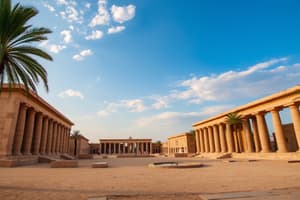Podcast
Questions and Answers
Which ancient civilization was located between the Tigris and Euphrates rivers?
Which ancient civilization was located between the Tigris and Euphrates rivers?
- India
- Mesopotamia (correct)
- China
- Greece
Which ancient civilization is known for its emphasis on democracy and physical and intellectual pursuits?
Which ancient civilization is known for its emphasis on democracy and physical and intellectual pursuits?
- China
- India
- Rome
- Greece (correct)
Which ancient civilization was known for developing the writing system called cuneiform?
Which ancient civilization was known for developing the writing system called cuneiform?
- Egypt
- India
- Mesopotamia (correct)
- Rome
During which period did the Maurya Empire flourish, contributing to cultural advancements in India?
During which period did the Maurya Empire flourish, contributing to cultural advancements in India?
In which ancient civilization did pharaohs rule a centralized government?
In which ancient civilization did pharaohs rule a centralized government?
Which ancient civilization is famous for its architectural masterpieces like the Parthenon?
Which ancient civilization is famous for its architectural masterpieces like the Parthenon?
Which ancient civilization developed the architectural marvels known as ziggurats?
Which ancient civilization developed the architectural marvels known as ziggurats?
Which ancient civilization's decline was marked by economic instability, military pressures, and internal power struggles?
Which ancient civilization's decline was marked by economic instability, military pressures, and internal power struggles?
Which ancient civilization had advanced irrigation systems and developed the wheel?
Which ancient civilization had advanced irrigation systems and developed the wheel?
From which ancient civilization do the Romance languages spoken in Europe today originate?
From which ancient civilization do the Romance languages spoken in Europe today originate?
Which ancient civilization considered their rulers to be divine beings?
Which ancient civilization considered their rulers to be divine beings?
Which ancient civilization is known for making significant strides in areas such as agriculture, technology, philosophy, and trade?
Which ancient civilization is known for making significant strides in areas such as agriculture, technology, philosophy, and trade?
Flashcards are hidden until you start studying
Study Notes
Ancient Civilization
Exploring the history of human civilization reveals fascinating insights into early societies and their accomplishments. The study of ancient civilizations often involves examining archaeological evidence, studying written records, and piecing together the remaining fragments to build a more comprehensive understanding of our past. In this article, we'll delve into some of the most influential ancient civilizations, including Mesopotamia, Egypt, India, China, Greece, and Rome.
Mesopotamia
Mesopotamia was one of the earliest cradles of civilization, located between the Tigris and Euphrates rivers in what is now Iraq. This region became home to several powerful city-states such as Babylon, Assyria, and Sumer. Mesopotamians were known for their innovations in agriculture, writing systems like cuneiform, and legal codes that formed the basis for modern law. Some notable achievements include the development of the wheel, advanced irrigation systems, and architectural marvels like ziggurats.
Egypt
Egypt's pharaonic era, which lasted from around 3100 BC to 30 BC, saw the rise of one of the world's greatest civilizations. Known for its pyramids and hieroglyphic script, ancient Egypt had a centralized government ruled by pharaohs who considered themselves divine beings. Agriculture played a crucial role in Egyptian society, with crops like wheat and barley providing sustenance. Their achievements in engineering and mathematics have left lasting impacts, shaping much of Western culture.
India
Indian civilization dates back several thousand years, with the Indus Valley Civilization being one of the oldest urban cultures in the world. Spreading across parts of present-day Pakistan and India, this civilization boasted impressive cities like Harappa and Mohenjo-Daro before its decline around 1900 BCE. Over time, various kingdoms and empires rose to power, each contributing to the rich cultural tapestry that defines India today. Notable periods include the Maurya Empire under Ashoka and the Gupta Empire during which art, literature, and science flourished.
China
China, with its enduring civilization dating back over four millennia, has made significant strides in areas such as agriculture, technology, philosophy, and trade. Early dynasties like the Xia, Shang, and Zhou established foundational structures for governance and societal organization. Later, imperial dynasties like the Han, Song, Ming, and Qing continued to shape Chinese history through warfare, diplomacy, scientific advancements, and cultural achievements.
Greece
Ancient Greece, located in the southern tip of the Balkan Peninsula, is renowned for its significant contributions to Western civilization. Its city-states like Athens and Sparta are known for their philosophical, linguistic, and artistic advances. Greek civilization was marked by a direct democracy, where citizens could participate in decision-making, and a culture that emphasized physical and intellectual pursuits. Architectural masterpieces like the Parthenon remain standing today, testament to the ingenuity and vision of ancient Greek architects.
Rome
Rome, initially a small Latin village, grew into an influential empire that lasted over a millennium until it fell in 476 AD. The Romans were known for their military prowess, legal system, and architectural achievements like aqueducts and amphitheaters. Their Latin language formed the basis of the Romance languages spoken in Europe today. Rome's decline was marked by economic instability, military pressures from outside invaders, and internal power struggles.
Exploring these ancient civilizations offers invaluable insights into the development of human societies and their impact on our modern world. Each civilization had its unique strengths and achievements, shaping our understanding of history and culture. As we continue to learn from the past, we can appreciate these civilizations not just for their historical significance but also for what they tell us about ourselves and our shared human journey.
Studying That Suits You
Use AI to generate personalized quizzes and flashcards to suit your learning preferences.




